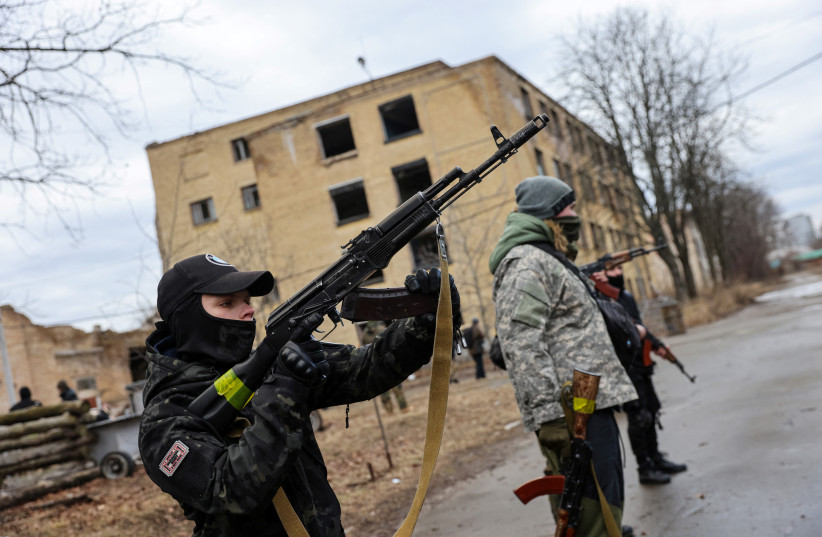With between 160,000 to 190,000 Russian troops now believed amassed along the Ukrainian borders, and as artillery fire is escalating in eastern Ukraine, Western leaders are intensifying war of words with Russia to get Moscow to stand down.
Evidence suggests Russia is planning for the “biggest war in Europe since 1945,” British Prime Minister Boris Johnson told the BBC on Sunday in an interview from the Munich Security Conference.
If Russian President Vladimir Putin does launch an invasion of Ukraine, the UK and US would unleash crippling sanctions against Russia, including stopping Russian companies from “trading in pounds and dollars,” he said, which would “hit very, very hard.” Other sanctions being discussed include banning the export of microchips and other crucial technology to Russian companies.
At that same conference, US Vice President Kamala Harris said: “Let me be clear, I can say with absolute certainty: If Russia further invades Ukraine, the United States, together with our allies and partners, will impose significant and unprecedented economic costs.”
Harsh words at a critical juncture.

And Israel? Where does Israel stand?
Defense Minister Benny Gantz, in a speech he delivered Sunday to the Munich conference, devoted just 65 rather innocuous words – in a nearly 950-word address that dealt primarily with Iran – to the Ukraine crisis.
“Now, as clouds of war gather above us, it is the responsibility of the world leaders to spread calm, to promote discourse and to uphold the principles that will preserve world peace and security,” he said. “This should be the approach towards the conflict in Ukraine – and I call on all parties, even if we are in the last minutes – everything must be done to prevent bloodshed.”
With this very vague statement about a crisis that could engulf Europe in war, Gantz was heeding the diplomatic advice offered on Sunday by Finance Minister Avigdor Liberman.
“I believe this is not our business,” Liberman said regarding the Russian-Ukrainian tension in a Radio 103 interview. “You have the involvement there of all the powers. Let us not exaggerate our self-importance. The smartest thing we can do is to keep as low a profile as possible, and what needs to interest us is not Ukraine, but rather the nuclear talks in Vienna – and that is much more worrisome.”
Prime Minister Naftali Bennett also heeded Liberman’s advice. While he did address the crisis over Ukraine during opening remarks at the weekly cabinet meeting, he only dealt with the narrow issue of calling on Israeli nationals to get out of the country as soon as possible.
That was it. No value judgments, no pledges of joining the West in sanctions against Russia. Not particularly heady stuff.
Israel, concerned about complicating its sensitive relations with Russia, is not adding to the war of words and is hoping the United States will understand why not.
For those familiar with the Middle East, Israel’s position is completely understandable. Russia is now a key player in the region, particularly in Syria, and Israel needs to tiptoe carefully around Moscow if it wants to continue to have the freedom of action it currently enjoys in striking at Iranian assets in Syria to keep Iran and Hezbollah from entrenching themselves there.
But what of the call by Harris for America’s “allies and partners” to join in the proposed unprecedented economic sanctions against Russia?
The US has few allies and partners around the world who feel as close to it as Israel, so will Jerusalem be expected to follow Washington’s suit and join in these sanctions?
If it did, this would significantly complicate Jerusalem’s relationship with Russia, something that the US – as an ally of Israel – has little interest in seeing.
The last thing anyone for whom stability in the Middle East is important wants to see is Russian and Israeli planes clashing over Syrian skies.
Israel joining unprecedentedly tough sanctions against Russia could, conceivably, lead to just that, since it could spell the end to the deconfliction mechanism between Moscow and Jerusalem that has been in place since Russia moved into Syria in 2015.
So far, the US has demonstrated understanding of Israel’s situation, and there have been no public calls from Washington for Israel to take sides in this conflict. And it is not as if the US is shy about telling Israel how to handle relations with third countries – witness the demands it has made on Israel to limit China’s involvement in infrastructure development in Israel.
Rather, this is a sign that the US understands Israel’s diplomatic predicament here.
For instance, there was no American public protest when Israel – not wanting to irritate the Russians – reportedly nixed a Ukrainian request to buy Iron Dome batteries from the US last spring. Since the Iron Dome is a joint Israeli-US project, any transfer of the system to a third country needs the approval of both countries.
Likewise, senior Israeli officials have said in the last two weeks that there has been no American pressure on Israel to pick a side in the current European crisis.
But as things heat up in Ukraine, this position may change. One of Israel’s main diplomatic challenges, therefore, will be the need to remind the US of Israel’s sensitive position vis-à-vis Russia and to ensure that Washington does not press Jerusalem to join the “mother of all sanctions” that Washington may unleash if Putin invades his southwestern neighbor.
